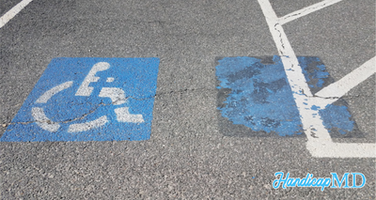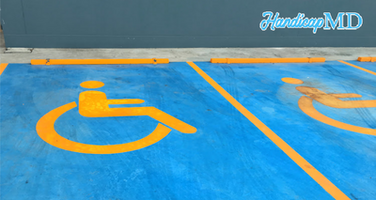
Disabled Parking Permit in Tucson: How to Obtain and Use a Handicap Parking Permit
Disability tags, also known as parking placards or license plates, play a crucial role in making Tucson, AZ, more accessible for individuals with disabilities. These tags ensure that residents and visitors with mobility challenges or other qualifying conditions can park in designated spaces that provide convenient access to public and private facilities. This guide will provide comprehensive information on how to obtain and use a disability tag in Tucson, covering everything from eligibility criteria to the application process.
Introduction to Disabled Parking Permits in Tucson
In Tucson, disability tags are issued by the state Department of Transportation (ADOT) and are governed by state and federal regulations, including the Americans with Disabilities Act (ADA). These tags allow individuals with qualifying conditions to park in reserved spaces that are closer to building entrances, ramps, and elevators, reducing the physical strain of navigating large spaces or lots.
By promoting equitable access, disability tags empower individuals to lead independent lives, participate in community activities, and engage in daily tasks with less difficulty. The city's emphasis on accessibility reflects the city’s commitment to inclusivity and the well-being of its residents and visitors.
Eligibility Criteria
To obtain a handicap permit in Tucson, individuals must meet specific criteria established by ADOT. These criteria ensure that only those who genuinely need accessible privileges receive them.
Who Qualifies for a Disability Tag?
Eligibility is based on the presence of a physical or medical condition that significantly limits mobility or the ability to perform basic tasks without assistance. Individuals must provide proof of their condition through medical certification.
Qualifying Criteria
Applicants must meet at least one of the following conditions:
Inability to Walk Without Assistance:
- Cannot walk 200 feet without stopping to rest.
- Requires the use of assistive devices such as a wheelchair, walker, crutches, or prosthetics.
Severe Respiratory Conditions:
- Dependence on portable oxygen.
- Lung conditions that significantly limit physical activity.
Cardiovascular Impairments:
- Heart conditions classified as Class III or IV by the American Heart Association, indicating severe physical limitations.
Severe Mobility Limitations:
- Amputation of one or both legs or severe difficulty using lower limbs.
Visual Impairments:
- Legal blindness or conditions that severely limit sight.
Other Medical Conditions:
- Any condition certified by a licensed medical professional as substantially impairing mobility.
Common Medical Conditions and Examples
Disability tags are designed to accommodate a wide range of medical conditions. Below are some examples of common qualifying conditions and resources available for individuals seeking assistance.
Examples of Medical Conditions
Orthopedic Disorders:
- Arthritis causing chronic pain and limited mobility.
- Post-surgical recovery from joint replacement procedures.
Neurological Conditions:
- Parkinson’s disease leading to instability and difficulty walking.
- Multiple sclerosis (MS) causing muscle weakness or paralysis.
Respiratory Illnesses:
- Chronic obstructive pulmonary disease (COPD).
- Asthma with severe limitations on physical exertion.
Cardiovascular Conditions:
- Congestive heart failure (CHF) leading to extreme fatigue.
- Angina or severe arrhythmias that limit walking distance.
Visual Impairments:
- Glaucoma causing tunnel vision.
- Retinitis pigmentosa leading to severe visual impairment.
Different Types of Disabled Parking Permits Available in Tucson
Disability tags come in various forms, catering to the diverse needs of individuals with disabilities. Applicants can choose from the following options:
1. Disability Placards
- Temporary Tags:
- For short-term conditions such as recovery from surgery or an injury.
- Valid for six months and renewable with updated medical certification.
- Permanent Tags:
- For individuals with long-term or permanent disabilities.
- Valid for up to five years, requiring renewal before expiration.
2. Disability License Plates
- Designed for individuals with permanent disabilities who own or lease vehicles.
- Include the international accessibility symbol and are affixed to the vehicle.
3. Organizational Placards
- Issued to organizations that regularly transport individuals with disabilities.
- Allow designated vehicles to access accessible spaces.
Step-by-Step Application Process
Applying for a handicap placard in Tucson is a straightforward process, but it requires careful attention to detail. Follow these steps to ensure a successful application:
Step 1: Obtain the Application Form
- Download the Disability-Hearing Impaired Plate/Placard Application (Form 96-0104) from the state Department of Transportation (ADOT) website.
- Forms are also available at local Motor Vehicle Division (MVD) offices in the city.
Step 2: Complete the Applicant Section
- Fill out your personal information, including:
- Full name.
- Address.
- Date of birth.
- Driver’s license or ID number.
- Indicate whether you are applying for a temporary tag, permanent tag, or disability license plate.
Step 3: Obtain Medical Certification
- Have a licensed HandicapMD healthcare provider complete and sign the medical certification section of the form.
- The provider must confirm your qualifying condition and provide their medical license number and signature.
Step 4: Submit the Application
- Submit your completed application form to ADOT either in person or by mail.
- In Person: Visit a local MVD office for faster processing.
- By Mail: Send your application to the address listed on the form.
Step 5: Pay Applicable Fees
- Temporary and permanent tags are typically free of charge.
- Disability license plates may require standard vehicle registration fees.
Step 6: Receive Your Disability Tag
- Approved applicants will receive their tag or license plate by mail or directly at the MVD office, depending on the submission method.
Additional Tips and Best Practices
- Plan Ahead: Begin the application process early to account for potential delays, especially if medical certification is required.
- Keep Copies: Retain copies of your application and medical documentation for future reference.
- Renew on Time: Mark your calendar to renew your disability tag before it expires to avoid lapses in accessibility privileges.
Fees
One of the most common concerns about disability tags is the cost. The fees for disability tags are minimal or nonexistent, reflecting the city's commitment to accessibility for all residents.
Placard Fees
- Temporary Tags: Free of charge. These are issued for short-term disabilities and valid for six months.
- Permanent Tags: Free of charge. These are for individuals with long-term or permanent disabilities and must be renewed every five years.
Disability License Plate Fees
- Standard Vehicle Registration Fee: The only cost associated with obtaining a disability license plate is the standard vehicle registration fee. There are no additional fees for the disability designation.
- Specialty Plates: If you opt for a specialty plate with a disability symbol, additional fees may apply, depending on the design.
Replacement Fees
- Replacing a lost, stolen, or damaged tag or plate typically involves a nominal fee, which is detailed in the "Replacing Disability Tags" section below.
Validity and Expiration
Understanding the validity and expiration of disability tags helps ensure uninterrupted use of their benefits. The city follows state guidelines set by the state Department of Transportation (ADOT) for tags and plates.
Temporary Tags
- Validity: Up to six months.
- Purpose: Designed for short-term disabilities, such as recovery from surgery or injury.
- Renewal: If the condition persists beyond six months, you must reapply with updated medical certification.
Permanent Tags
- Validity: Five years.
- Renewal: Renewal is required at the end of the five-year period but does not require updated medical certification unless your circumstances change.
Disability License Plates
- Validity: Tied to the vehicle's registration cycle, which is typically one or two years.
- Renewal: Renew during the vehicle registration process.
Renewal Process
To continue enjoying the benefits of your disability tag, it’s important to renew it before it expires. The renewal process is straightforward and user-friendly.
Steps to Renew a Disability Tag
Check Expiration Date
- Temporary tags expire after six months.
- Permanent tags have a five-year validity. Disability plates follow the vehicle's registration cycle.
Obtain the Renewal Form
- Visit the Arizona Department of Transportation (ADOT) website to download the renewal application.
- Forms are also available at local Motor Vehicle Division (MVD) offices.
Complete the Renewal Application
- For permanent tags and license plates, you typically do not need updated medical certification unless your eligibility has changed.
- Temporary tags require updated medical certification to verify continued need.
Submit the Application
- Renewals can be submitted:
- Online: Through the ADOT portal for license plates tied to vehicle registration.
- In Person: At an MVD office for tags.
- Renewals can be submitted:
Receive Your Renewal
- Permanent tags and disability license plates are mailed after approval.
- Temporary tags may be issued on the spot if renewed in person.
Replacing Lost, Stolen, or Damaged Handicap Permits in Tucson
Losing your handicap placard can be inconvenient, but the city makes the replacement process simple.
Steps to Replace a Disability Tag
Report the Loss or Theft (Optional)
- While not required, reporting a stolen disability tag or license plate to the local police can provide documentation that may be helpful during the replacement process.
Obtain a Replacement Application
- Visit the ADOT website to download the replacement application form.
- Forms are also available at local MVD offices.
Complete the Application
- Provide details about the lost, stolen, or damaged tag.
- If applicable, include a police report number for stolen items.
Submit the Application
- Submit the completed form in person at an MVD office.
- Bring identification and any supporting documentation.
Pay the Replacement Fee
- A small replacement fee may apply. Contact the MVD for the exact amount.
Receive Your Replacement
- Approved replacement tags are issued promptly, either in person or by mail, depending on how you submit the application.
Benefits of Having a Disabled Parking Permit in Tucson
Disability tags provide numerous benefits, significantly improving the quality of life for individuals with disabilities. Here are some key advantages of having a disability tag:
1. Accessible Spaces
- Tags allow you to park in designated accessible spaces near entrances, ramps, and elevators, reducing physical strain and saving time.
2. Independence and Convenience
- Disability tags empower individuals to navigate their daily routines more easily, including errands, medical appointments, and social activities.
3. Safety
- Accessible spaces are wider, providing room for mobility aids such as wheelchairs, walkers, and scooters. This reduces the risk of accidents when entering or exiting vehicles.
4. Nationwide Recognition
- City-issued disability tags are recognized across the United States under ADA guidelines, ensuring consistent access when traveling.
5. Enhanced Community Inclusion
- By facilitating access to public spaces, disability tags help individuals participate more fully in community events, fostering inclusivity and engagement.
6. Free or Discounted Spaces
- In some areas, disability tags allow free access or extended time, depending on local ordinances. Always check signage for specific rules.
Rules for Using Disabled Parking in Tucson
Using handicap parking responsibly is crucial to maintain accessibility for those who genuinely need it. Here are the main rules to follow when utilizing accessible spaces in the city:
1. Display Your Disability Tag Properly
- Placards: Hang the tag from the rearview mirror with the front side (showing the international accessibility symbol) clearly visible. Remove it when driving to avoid obstructing your view.
- License Plates: Ensure the disability license plate is permanently affixed to the rear of the vehicle.
2. Use the Tag Only When Necessary
- Disabled accessible privileges apply only when the individual with the disability is present in the vehicle, either as the driver or passenger.
- Allowing someone else to use your tag without you present is considered misuse and is subject to penalties.
3. Park Only in Designated Spaces
- Accessible spaces are marked with the international accessibility symbol and blue pavement lines. Some spaces include signage indicating van accessibility, which should be prioritized for larger vehicles equipped with wheelchair ramps or lifts.
4. Do Not Park in Striped Access Aisles
- The striped areas adjacent to accessible spaces are reserved for wheelchair lifts, ramps, and other mobility aids. Occupying these areas is prohibited and can result in fines.
5. Obey Time Limits
- Some accessible spaces in the city have posted time limits, especially in high-demand areas. Always check the signage for restrictions and adhere to them.
6. Avoid Misuse
Misusing a disability tag, such as using it after it has expired or providing it to an unauthorized individual, can result in:
- Fines up to $500.
- Suspension or revocation of these privileges.
- Potential legal action for repeated violations.
By following these rules, you help preserve the integrity of the city's accessible system and ensure that spaces are available for those who genuinely need them.
Regulations for Parking in Accessible Spaces
The city enforces state and federal regulations to protect accessible spaces and ensure they are used appropriately. Here are the key regulations you should know:
1. Americans with Disabilities Act (ADA)
Under the ADA, all public and private facilities must provide accessible spaces for individuals with disabilities. These spaces must meet specific design standards, including:
- Width to accommodate mobility aids.
- Signage with the international accessibility symbol.
- Striped access aisles for vehicle ramps and lifts.
2. State Laws
In addition to the ADA, state laws govern the use of accessible spaces. Violations include:
- Occupying an accessible space without a valid disability tag or license plate.
- Using a tag or plate that has expired or does not belong to the vehicle’s occupant.
3. Local Enforcement
Rules are strictly enforced by local authorities. Violations can result in:
- Citations and fines ranging from $100 to $500, depending on the offense.
- Towing of the vehicle if it obstructs access or creates a hazard.
4. Reserved Spaces
Some businesses or facilities may designate accessible spaces for specific uses, such as for employees or hospital patient access. These spaces may have additional restrictions or require special permits.
Where Can You Park with a Handicap Permit in Tucson?
A disability tag allows you to park in various locations throughout the city. However, knowing the specific rules for each setting ensures that you use your privileges correctly and avoid fines.
1. Accessible Spaces
- Reserved spots are located in public and private lots, including shopping centers, medical facilities, schools, and government buildings.
- These spaces are marked with blue lines and the international accessibility symbol on signs or pavement.
2. On-Street Spaces
- The city provides accessible on-street spaces in high-traffic areas like downtown and near public parks. These spaces are often located close to intersections or building entrances.
3. Public Lots and Garages
- City-owned lots and garages include designated accessible spaces. For example, the Park Tucson program ensures accessible spots is available in garages and surface lots across the city.
4. Residential Areas
- Residents with disabilities can apply for reserved accessible spaces near their homes through the city's local government. Contact the city’s Department of Transportation for details.
5. Recreational and Tourist Sites
- The city's popular attractions, such as the AZ-Sonora Desert Museum and Sabino Canyon, provide accessible spaces for visitors with disabilities. These spaces are typically located near entrances and visitor centers.
Is Handicap Parking Free in Tucson?
One of the perks of having a disability tag is the potential for free or discounted spaces in some areas. Here’s what you need to know about the fees in the city:
Free Accessible Spaces
- In many parts of the city, occupying an accessible spot is free for vehicles displaying a valid disability tag or license plate. This includes most on-street spaces and public lots.
- Some city-owned garages offer free or discounted spaces for disabled drivers. Check with the Park Tucson program for specific policies.
Paid Spaces Exceptions
- Private lots, such as those at shopping centers or event venues, may charge regular fees even for vehicles with disability tags.
- Always check the posted signs for the rates and regulations.
Time Limits and Meters
- The city allows vehicles with disability tags to park for free at metered spaces, but time limits may still apply. For example, a two-hour meter may allow free use for two hours, after which the vehicle must be moved.
Special Permits for Extended Use
- If you require extended use due to a disability, you can apply for an exemption from time limits through the state MVD or local government offices.
Penalties for Misusing Accessible Parking Spaces in Tucson, AZ
Accessible spaces are protected under federal, state, and local laws to ensure they are available for individuals with disabilities. Misusing these spaces or disability tags can result in severe consequences.
Common Violations and Their Consequences
Occupying an Accessible Space Without a Valid Disability Tag
- Violation: Using an accessible space without a valid tag or license plate.
- Penalty: Fines ranging from $100 to $500, depending on the severity of the offense.
Using Another Person’s Disability Tag
- Violation: Borrowing or using a disability tag assigned to someone else.
- Penalty: Fines and potential suspension of these privileges. Repeat offenses may lead to criminal charges.
Using an Expired or Invalid Tag
- Violation: Displaying a tag or license plate that has expired or is no longer valid.
- Penalty: Fines and confiscation of the tag.
Occupying Access Aisles
- Violation: Parking in the striped access aisle adjacent to an accessible space.
- Penalty: Fines and possible towing of the vehicle.
Falsifying Information for a Disability Tag
- Violation: Providing false information during the application process to obtain a disability tag.
- Penalty: Revocation of the tag, fines, and potential legal action.
How Enforcement Works
- Law enforcement and officers regularly monitor accessible spaces in the city.
- Reports from concerned citizens can also lead to citations for violations.
By adhering to the rules, you help preserve the integrity of the system and ensure these spaces are available for individuals who truly need them.
How to Display Your Handicap Parking Permit Correctly
Proper display of your Arizona handicap placard is essential for compliance with the city’s parking regulations. Incorrect display may result in fines or your vehicle being towed.
For Placards
- Placement: Hang the tag from the rearview mirror when parked in an accessible space.
- Visibility: Ensure the tag's front side, which displays the international accessibility symbol, is visible through the windshield.
- Driving: Remove the tag while driving to avoid obstructing your view.
For License Plates
- Attachment: Affix the disability license plate securely to the rear of your vehicle.
- Validation Sticker: Ensure the plate has a valid registration sticker to confirm it is current.
Tips for Proper Use
- Always carry your disability tag registration paperwork as proof of validity in case of disputes.
- Double-check that your tag is displayed correctly before leaving your vehicle to avoid accidental citations.
Using Your Tucson Disabled Parking Permit in Other States
If you’re traveling outside the city, you can still use your city-issued disability tag. Here’s what you need to know:
Nationwide Recognition Under ADA
- City-issued disability tags are valid across all 50 states under the Americans with Disabilities Act (ADA). This ensures individuals with disabilities have consistent access to parking accommodations when traveling.
State-Specific Rules
While your tag is valid nationwide, individual states may have different rules. For example:
- Time Limits: Some states may impose time limits for utilizing accessible spaces.
- Metered Spots: Not all states provide free use at metered spaces for disability tag holders.
Tips for Using Your Tag While Traveling
- Research local parking regulations before your trip to avoid confusion or penalties.
- Always display your tag properly, as improper display may lead to fines even if you are legally parked.
- Keep a copy of your tag registration and medical certification with you as backup documentation.
By understanding and following the rules in other states, you can travel with confidence while enjoying the benefits of your disability tag.
FAQs
1. How Do I Apply for a Disability Tag?
To apply for a disability tag, you must complete the Disability-Hearing Impaired Plate/Placard Application (Form 96-0104) from the state Department of Transportation (ADOT). You’ll also need medical certification from a licensed healthcare provider. Submit your application in person or by mail to the ADOT or your local MVD office.
2. Can I Use My Disability Tag in Any Vehicle?
Yes, tags are transferable and can be used in any vehicle in which the eligible individual is traveling. However, license plates are vehicle-specific and must remain affixed to the registered vehicle.
3. What Should I Do If My Disability Tag Is Lost or Stolen?
Report the loss or theft to local law enforcement if necessary, then apply for a replacement tag through the ADOT. Complete the replacement section of the application form and pay any applicable fees.
4. Are Disability Tags Free?
Temporary and permanent tags are free of charge. However, disability license plates require payment of the standard vehicle registration fees. Specialty plates may incur additional costs.
5. Can I Park Anywhere With a Disability Tag?
No, you can only park in designated accessible spaces or locations allowed by your tag. Parking in access aisles, fire lanes, or no-parking zones remains prohibited.
Conclusion
Disability tags in Tucson provide invaluable support for individuals with disabilities, offering convenient access to parking and promoting greater independence. However, proper use of these tags is essential to maintain the system’s integrity and ensure spaces remain available for those who need them most.
Understanding the penalties for misuse, displaying your tag correctly, and knowing how to use it while traveling helps you navigate the city's parking system with confidence.
Apply through HandicapMD.com
Ready to apply for a disability tag in Tucson? Visit HandicapMD.com today to get started. Our team simplifies the process by connecting you with licensed professionals who can certify your application and ensure you receive your tag quickly and hassle-free. Let HandicapMD.com help you access the benefits you deserve!
.png)






